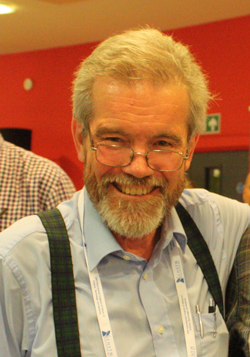Lyell’s notebooks are at risk of export. Support a crowd-funding initiative to keep this valuable resource in the UK, urges John Henry
Henry, J., Dig deep for Lyell’s notebooks.
Geoscientist 29 (6), 9, 2019
https://doi.org/10.1144/geosci2019-032;
Download the pdf here

The discoveries and developments of the Victorian period underpin and shape our geological framework: The expansion and refinement of William Smith’s stratigraphic concepts, the definition and naming of the eons, eras, systems, series and many stages that are part of our geological DNA and working vocabulary.
Cultural value
Charles Lyell [1797-1875] was a major thinker and influencer in the development of the Earth sciences. Lyell’s first edition of his Principles of Geology accompanied the young geologist Charles Darwin on his famous voyage of discovery on the HMS Beagle.
“‘Darwin always believed that
his books 'came half out of Lyell's brains'.”
1 Lyell was a well-travelled and prolific author of books (6), through several revised editions (30) and numerous journal articles (87)
2. The twelve revised editions from 1830-1875 effectively trace the progress of geological knowledge in this formative period. Lyell’s writings were read widely by the aspiring and influential classes of his period and thus have significant wider cultural value as the first major works that popularised geology as a serious yet accessible science.
Export risk
Throughout his life, Lyell recorded his observations meticulously with frequent cross-references to articles, books, conversations and letters, in a legible hand. Overall, he filled 287 notebooks, of which 284 have now surfaced from his descendant’s library. The death of the third Baron Lyell has forced his executors to sell his library’s contents in order to pay death duties. Lyell’s notebooks have had an offer from an unknown transatlantic individual. The intended purchase faces a temporary export ban to allow time to raise funds to keep the notebooks in the UK. The required sum is £1,444,000.
To fulfil the conditions of the ban, various institutions have agreed to support the University of Edinburgh Library to lead the fund-raising and to provide the home for the notebooks. They would join the largest collection of Lyell material from a Victorian bequest. Importantly, the University of Edinburgh Library would make the notebooks digitally available to the public.
Securing this important resource for the public and academics to research would advance our knowledge of our subject and one of its great thinkers. Studying the history of geology provides a means to connect with ‘how we know what we know’, intellectually and from past field observations. It can only be achieved if original material, such as Lyell’s notebooks, are archived and made available. In the uncertain scenario of an anonymous buyer, the way forward is to secure them for a reliable institution committed to making them accessible.
Crowd-sourcing
Major donations from benevolent individuals, charities, corporations and institutions have been secured. However, their generosity does not amount to the full sum needed. A public fund-raising campaign has been launched to secure the remaining amount. The success of this initiative relies on smaller groups and societies giving what they can and for individuals to respond wholeheartedly to the crowd-sourcing website (
https://www.ed.ac.uk/giving/save-lyell-notebooks). Please, if you can, dig deep!
References
1 The Darwin Project:
https://www.darwinproject.ac.uk/charles-lyell (accessed 18/05/19).
2 Baldwin, S.A. (2013) A Brief Bibliography of Sir Charles Lyell, FRS, Bt, geologist. Baldwin’s Scientific Books, Witham, 31 pp.